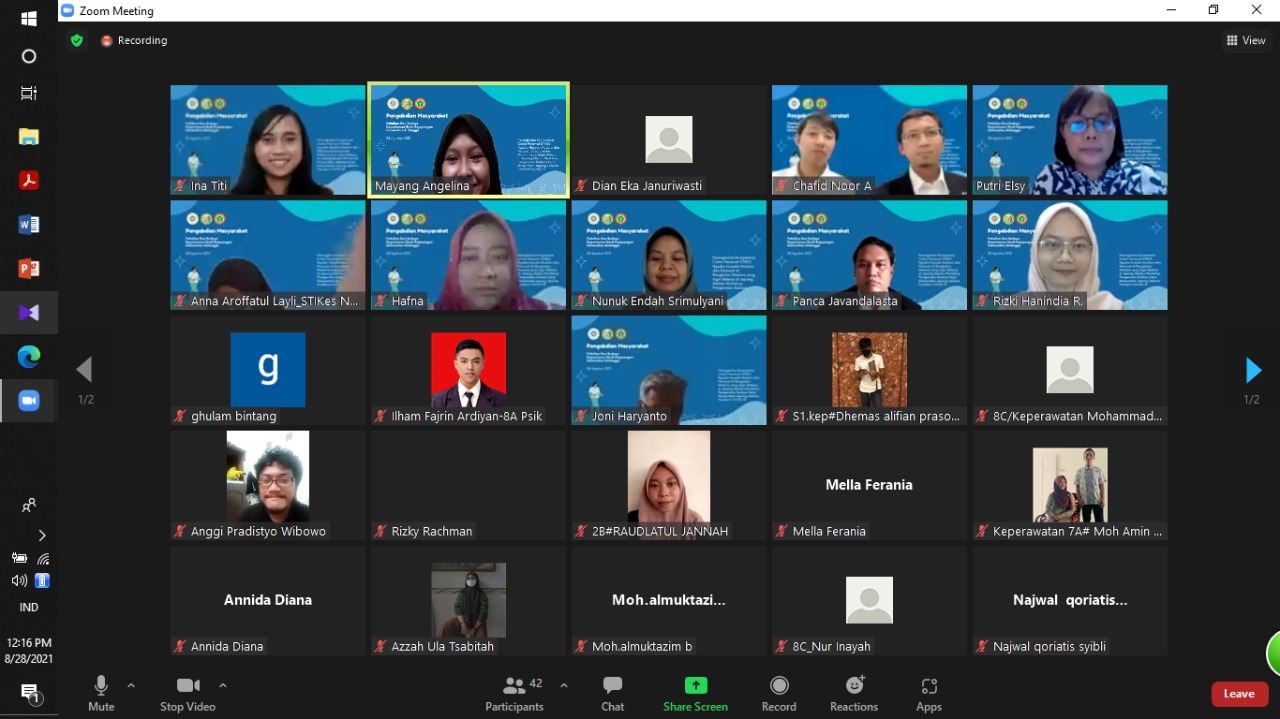UNAIR NEWS- Japanese Studies Study Program Faculty of Humanities (FIB) Universitas Airlangga on Saturday, August 28, 2021, held online community service activities in the form of seminars and workshops. The community service activities were led by Nunuk Endah Srimulyani SS, MA, Ph. D as the head of the study program on “Improving the Competence of Prospective Nurses of STIKES Ngudia Husada Madura and Nurses in Bangkalan Madura Who Want to Work in Japan through a Workshop on Introduction to Japanese Community Work Culture during the Covid-19 Pandemic”. In accordance with the theme, these seminars and workshops are intended for nurses who want to work in Japan.
The activity was a collaboration with STIKES Ngudia Husada Madura and the Indonesian National Nurses Association (PPNI) Bangkalan City. Due to the Covid-19 pandemic and the PPKM period, seminars and workshops were held via Zoom. Besides being attended by prospective nurses of STIKES Ngudia Husada Madura and nurses in Bangkalan Madura, the activity was also aimed at nurses or prospective nurses who want to work as nurses or caregivers in Japan.
The seminar and workshops, divided into the first and second sessions, were attended by 150 participants. Dr. Joni Haryanto, S.Kp., M. Sc an UNAIR Faculty of Nursing lecturer, delivered material about the opportunities and challenges of Indonesian nurses to work in various parts of the world. In his presentation, he explained the needs of nurses in several countries in the world.
“Nurses are the future human resources needed from the service sector around the world. In 2025 there will be a deficit of 10 million nurses in the world so that it becomes an opportunity and a challenge for Indonesian nurses to work globally,” said Dr. Joni.
The second speaker, Putri Elsy, S.S., M. Sc., a lecturer at UNAIR’s Japanese Studies Study Program, explained why Japan needs many nurses. Japan’s population changes with the decreasing birth rate and increasing elderly population, causing Japan’s shortage of nurses.
Putri said that the cooperation in sending nurses was established between the Indonesian and Japanese Governments under the EPA (Economic Partnership Agreement) scheme in 2007. In 2008, the first nurses and caregivers who worked in hospitals and nursing homes were sent to Japan.
In her presentation titled “The Aging Society and Opportunities for Indonesian Nurses in Japan” Putri explained that currently Japan is known as a hyper-aged society country with an elderly population of 28.4 percent in 2019.
“With this large number of elderly people, by 2025 Japan will need 380.000 nurses. This is the challenge and opportunity for Indonesia to send nurses to work as nurses and caregivers to Japan,” said Putri.
The head of the community service team, Nunuk Endah Srimulyani, S.S M.A., Ph.D., gave the last presentation on “Japanese Language and Culture Learning Strategy for Foreign Nurses in Japan”. In her presentation, Nunuk gave practical tips in learning Japanese that each participant can directly practice. The Japanese language is an obstacle faced by prospective nurses to work in Japan.
To get an accurate picture and deepen the participant’s knowledge about the work of nurses in Japan, this time, the Community Service invited Ina Titi Sri Wulandari, an Indonesian nurse who is currently working at Fuke Hospital Japan. Nurse Ina shared her experience working in Japan with a presentation entitled “Tips to Break the Competition of Nurses and Overcome Culture Shock in the Japanese Medical World.” In her presentation, Ina, who has lived for ten years in Japan, explained the challenges and tips to pass the nursing exam in Japan.
The last speaker was Kazuya Miyamoto from KMK Ltd., presenting “Procedures for being a Nurse and Caregiver in Japan.” In this last material, the participants gained insights on the procedures needed to become nurses and caregivers in Japan.
Apart from presentations from various resourceful persons in their respective fields, this seminar and workshop also held discussion sessions useful for participants and speakers. With the questions from the participants, their knowledge improved, thanks to the explanation coming from the experienced speakers. (*)
Author: Rizki Hanindia Rasyid
Editor: Binti Q. Masruroh





